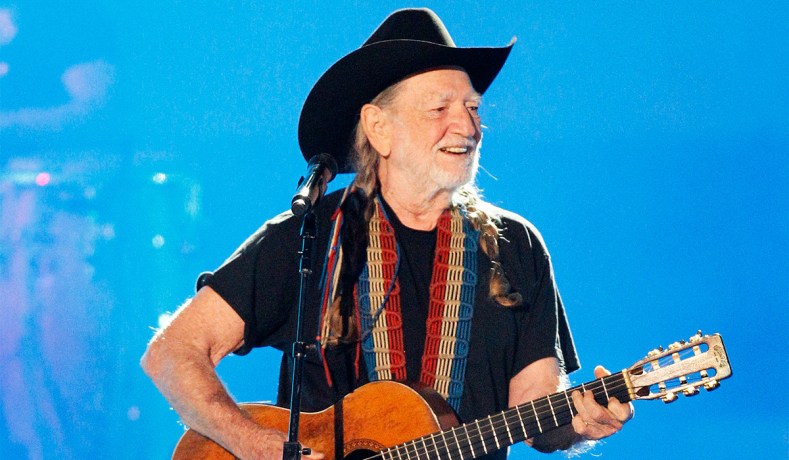

‘I’ll quit when Willie quits.” That’s the back of a T-shirt crafted by the folks at Poodie’s, a Texas Hill Country bar and roadhouse featuring regular live music. Poodie’s was founded by Willie Nelson’s late stage manager and close friend, Poodie Locke. The braided country legend, meanwhile, has certainly not yet quit. After a string of flu-related show cancellations, Willie is back on the road and due to release his 73rd studio album on April 27. Two days later, he’ll turn 85.
These days, much of the talk surrounding Willie Nelson involves quiet awe that he’s still running around like he always has — singing and songwriting and touring and utilizing his fifth-degree martial arts black belt — rather than kicking back, relaxing, and calling it a day. Nelson’s album from last year, God’s Problem Child, boasts the delightful song “Still Not Dead”:
I woke up still not dead again today.
The Internet said I had passed away.
If I died I wasn’t dead to stay.
And I woke up still not dead again today.
His new album, Last Man Standing, also toys with the theme of mortality. “I don’t wanna be the last man standing,” Nelson sings, mentioning his friends — “Waylon and Ray and Merle and old Norro” — who have passed on. “Or wait a minute,” he adds, “maybe I do.”
I grew up listening to Willie Nelson; his voice bounced around our full-sized Ford van as the soundtrack to many childhood road trips. When I met my husband, our first conversation was about Willie Nelson. I’ve seen Willie in concert at least five times — once in New York City, three times in Chicago, and twice in Texas. The New York City show, held at Irving Plaza, went on so late that I, then an energetic and fresh-out-of-college twentysomething, had to quit before Willie did.
In short, we’re talking about an amazing human being.
I thought about Willie Nelson in recent weeks after seeing a live performance by an unfamiliar musician. I love live music, and there are few things better than discovering someone wildly talented and new. There’s nothing more annoying, however, than watching a show turn political — whether it’s from the right or the left.
As you might have already guessed, that’s exactly what happened. The music was impressive. The occasional divisive asides? Not so much. It’s a shame, because music can bring people together like little else. Great song lyrics can latch onto many different realities and mean remarkably different things to different people. Other songs, meanwhile — right now, I’m thinking of “Feelin’ Good Again,” by Robert Earl Keen — concoct a crisp narrative image in your head. When you throw politics into the mix, that magic shatters.
Guess who knows this? Willie Nelson. “I think you can do more with music than you can with arguments and politics. I think a song will reach more people than any other thing,” Nelson told Rolling Stone last year. “There’s a reason that it’s called ‘harmony’: When you play a show, there’s an energy exchange with the people that is unimaginable. It’s the reason I go out there. I get something out of it too.”
Willie Nelson has opinions and causes, of course: He’s far from apolitical, and is perhaps best known for his enthusiastic endorsement of marijuana. (Well, either that or his infamous 1990s run-in with the IRS, which led to the release of The IRS Tapes: Who’ll Buy My Memories? along with an amusing H & R Block television ad in the debacle’s wake.) In 2015 he declared himself a “great Bernie and Hillary fan”; in 2011, he briefly endorsed the libertarian-leaning Republican Gary Johnson for president before backing Dennis Kucinich.
When he’s asked about politics these days, Nelson manages a fairly dexterous approach, tending to express the most alarm at how people are increasingly entrenched.
But Nelson also seems to understand that politics have their place — they’ve certainly never shown up in any concert I attended — and that neither “team” is all it’s cracked up to be. “It’s the funniest thing I’ve ever seen in my life,” Nelson said during the 2016 election. “I’ve seen the circus a few times, but this beats any circus I’ve ever seen. . . . Seems like they’re just tearing each other down. They can’t wait to say something negative about somebody and then they still want us to vote for them.”
When he’s asked about politics these days — and because we’re a society obsessed with politics, a guy like Willie Nelson gets asked about the topic with alarming frequency — Nelson manages a fairly dexterous approach, tending to express the most alarm at how people are increasingly entrenched. His song about the 2016 election, “Delete and Fast Forward,” could potentially be summed up in two sentences: “Well, yikes, that happened. Time to move on.”
“Willie invites almost universal love from hippies and rednecks, liberals and conservatives — everyone except the professional pot-stirrers,” R. G. Ratcliffe wrote in Texas Monthly last year. He’s right. It’s a wildly impressive achievement. The world of Willie Nelson fandom, thank goodness, is largely a politics-free zone. We need more of that in our country, not less.